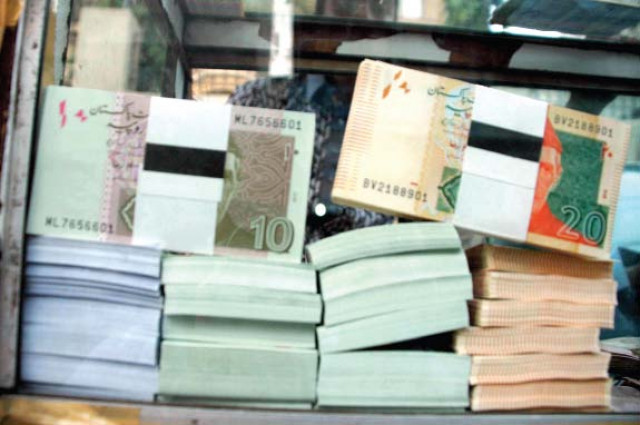Currency depreciation: SBP ready for ‘calibrated interventions’ to halt rupee decline
Experts rule out manipulation; blame oil payments, IMF programme halt.

Even as the rupee continues its recovery against the dollar, the State Bank of Pakistan has said that it stands ready to undertake “calibrated intervention” in the currency markets to stabilise the value of the rupee.
“The SBP keeps its monitoring and vigilance on prevailing market trends and is always ready to act appropriately to address them whenever the situation warrants,” said Syed Wasimuddin, the central bank’s spokesperson in an e-mail sent to The Express Tribune. “Among other measures, if required, the State Bank stands ready to do calibrated interventions.”
The threat of intervention by the central bank is made credible by the fact that it currently holds near-record levels of foreign exchange reserves of close to $18 billion.
(Read: Central bank to the rescue - Panic buying ends, rupee recovers 90 paisa)
On Monday, the rupee touched a record low of Rs90.70 against the US dollar in trading on the open currency markets, prompting the finance ministry to write a letter to the central bank, asking them to investigate the matter. The rupee has since recovered sharply, trading at Rs88.25 against the dollar in the Karachi currency markets.
Economists, central bank officials and experts have attributed the initial decline to a variety of factors, including unusually large oil payments in September as well as the conversion of an estimated Rs150 billion into dollars.
Among the factors that influenced the decline was the panic selling of the rupee caused by statements made by US Chairman of the Joint Chief Admiral Mike Mullen, blaming Pakistan for supporting groups attacking US forces in Afghanistan, leading many in the country to believe that a military confrontation between Pakistan and the US may be inevitable.
Not helping matters was Finance Minister Abdul Hafeez Shaikh’s announcement that Pakistan would end its bailout programme with the International Monetary Fund prematurely.
However, money market experts in both Karachi and Islamabad believe that the main reason for the sharp drop was the delay in oil payments due to the financial crisis in the domestic energy sector. That caused a 50% jump in the amount of oil payments that were due in September, from $1.2 billion to $1.8 billion.
Some experts also point out the fact that the total amount of local currency in circulation has declined by about Rs150 billion, which most believe has been converted to dollars. Foreign currency accounts, however, have not increased by a corresponding amount. “People may be holding dollars in the form of cash or have moved them abroad,” said one expert who wished to remain anonymous.
The US dollar has also appreciated significantly against other currencies in the international market as investors worry about the safety of the Euro-zone and move their assets to the dollar.
Most experts ruled out the possibility of manipulation by commercial bank treasurers – which had happened in 2004 – as a factor, though they blame the SBP for a delayed response.
The central bank spokesperson, however, said that the depreciation of the rupee was not massive, amount to about 1.7% since the beginning of July (taking into account this week’s recovery). He pointed out that the rupee had remained largely stable over the last three years.
Wasimuddin said that the fair value of the rupee was closer to the interbank exchange rate, which closed at Rs87.45 on Thursday. The open market rate is about Rs0.80 higher, a variation that is still slightly above normal.
Average daily trading volumes in the interbank currency market are $300 million, by far the most liquid segment of the currency market. Yet despite the reprieve the rupee may have caught this week, experts warn that the currency may once again come under pressure in March 2012, when the government has to start making repayments to the IMF. The first payment is around $1.4 billion. Additional reporting by Farhan Zaheer in Karachi
Published in The Express Tribune, September 30th, 2011.



















COMMENTS
Comments are moderated and generally will be posted if they are on-topic and not abusive.
For more information, please see our Comments FAQ